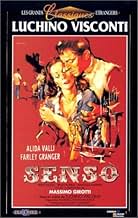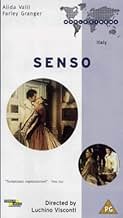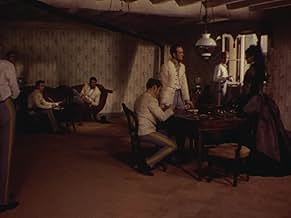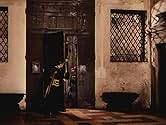AVALIAÇÃO DA IMDb
7,4/10
8,1 mil
SUA AVALIAÇÃO
Adicionar um enredo no seu idiomaAn Italian Countess is allied with Nationalists during the Italian-Austrian war of unification. However, she risks betraying their cause when she falls in love with an Austrian lieutenant.An Italian Countess is allied with Nationalists during the Italian-Austrian war of unification. However, she risks betraying their cause when she falls in love with an Austrian lieutenant.An Italian Countess is allied with Nationalists during the Italian-Austrian war of unification. However, she risks betraying their cause when she falls in love with an Austrian lieutenant.
- Prêmios
- 3 vitórias e 2 indicações no total
Franco Arcalli
- Un soldato
- (não creditado)
Aldo Bajocchi
- Un soldato
- (não creditado)
Ottone Candiani
- Un soldato
- (não creditado)
Nando Cicero
- Un soldato
- (não creditado)
Claudio Coppetti
- Un soldato
- (não creditado)
Cristoforo De Hartungen
- Il generale Hauptmann
- (não creditado)
Tony Di Mitri
- Un soldato
- (não creditado)
Enredo
Você sabia?
- CuriosidadesThe film opens in La Fenice, the Venice opera house. La Fenice was destroyed by arson in 1996, but reopened in 2003. Enlarged frames of this movie were used as a reference in reconstructing it.
- Citações
Il tenente Franz Mahler: It's too late! It's over! I'm not your romantic hero!
- Versões alternativasTwo versions of the film are available on video.
- One version is missing the scene where Livia tries to explain where all the money meant for the troops went.
- Another version is missing the climatic battle sequence between the Austrian and Italian troops.
- ConexõesEdited into Histoire(s) du cinéma: La monnaie de l'absolu (1999)
- Trilhas sonorasSinfonia N. 7 in mi maggiore (7th Symphony)
Music by Anton Bruckner
Performed by Orchestra Sinfonica Nazionale della Rai
Conducted by Franco Ferrara
Avaliação em destaque
Italy is still probably in ruins of war at this point, real or figurative, so what does this filmmaker do, Visconti? By waving his wand, he conjures up an earlier Italy, also in the throes of occupation and war, it's the last days of the Austrian occupation around Venice, but now it can all be placed in the safer distance of history, set up as operatic melodrama on a stage.
You'll see this self-referential waving of the hand in the just the opening scene. We open in an opera house in the middle of a play, with actors on stage valiantly rushing to weapons. As soon as the play is over, patriot viewers rain the place down with revolutionary pamphlets.
It is an operatic play that we see; film as opera. Up on this stage, collaboration with a regime can be safely contained in a love affair, rich countess falling for the dashing Austrian lieutenant. In the usual melodramatic passion, she risks all. The whole point of the story is to have moments like when news reach her of a battle won against the Austrians, but instead of rejoicing at liberation, she must look terrified because her beau might have been on that battlefield.
It's not something I can get excited about, nor would I recommend you go out of your way to find it, except as contrast to other, more pertinent things about how a viewer can be choreographed through space. I mean, here is a cinema of vistas and gestures. When a camera pans around a room that someone walks in, it's just this room that we see. War is suddenly introduced as a series of vistas with crowds rushing about, filmed in a disjointed way in order to convey chaos and mobilization and yet they manage to look placid and painterly.
But how about this? It ends with another self-referential note but now one that waves away illusion, dispels fiction. Having risked all, she finds out he's not the dashing hero of operas that she wanted him to be.
Up on this stage, turning your back on your countrymen is only the innocent fallout of passion, all because you maybe yearned for some of the romance of stories from the past.
You'll see this self-referential waving of the hand in the just the opening scene. We open in an opera house in the middle of a play, with actors on stage valiantly rushing to weapons. As soon as the play is over, patriot viewers rain the place down with revolutionary pamphlets.
It is an operatic play that we see; film as opera. Up on this stage, collaboration with a regime can be safely contained in a love affair, rich countess falling for the dashing Austrian lieutenant. In the usual melodramatic passion, she risks all. The whole point of the story is to have moments like when news reach her of a battle won against the Austrians, but instead of rejoicing at liberation, she must look terrified because her beau might have been on that battlefield.
It's not something I can get excited about, nor would I recommend you go out of your way to find it, except as contrast to other, more pertinent things about how a viewer can be choreographed through space. I mean, here is a cinema of vistas and gestures. When a camera pans around a room that someone walks in, it's just this room that we see. War is suddenly introduced as a series of vistas with crowds rushing about, filmed in a disjointed way in order to convey chaos and mobilization and yet they manage to look placid and painterly.
But how about this? It ends with another self-referential note but now one that waves away illusion, dispels fiction. Having risked all, she finds out he's not the dashing hero of operas that she wanted him to be.
Up on this stage, turning your back on your countrymen is only the innocent fallout of passion, all because you maybe yearned for some of the romance of stories from the past.
- chaos-rampant
- 26 de dez. de 2019
- Link permanente
Principais escolhas
Faça login para avaliar e ver a lista de recomendações personalizadas
- How long is Senso?Fornecido pela Alexa
Detalhes
- Data de lançamento
- País de origem
- Idiomas
- Também conhecido como
- Senso - Sedução da Carne
- Locações de filme
- Teatro La Fenice, Veneza, Vêneto, Itália(opening scenes)
- Empresa de produção
- Consulte mais créditos da empresa na IMDbPro
Bilheteria
- Orçamento
- ITL 700.000.000 (estimativa)
- Faturamento bruto nos EUA e Canadá
- US$ 27.723
- Fim de semana de estreia nos EUA e Canadá
- US$ 3.984
- 28 de out. de 2018
- Faturamento bruto mundial
- US$ 27.723
- Tempo de duração2 horas 3 minutos
Contribua para esta página
Sugerir uma alteração ou adicionar conteúdo ausente

Principal brecha
By what name was Sedução da Carne (1954) officially released in India in English?
Responda
![Assistir a Trailer originale italiano [OV]](https://m.media-amazon.com/images/M/MV5BYzc0Y2MyOGMtMzg0My00Mzc4LWIwYjItZjg1ZDhmMDZmOTlkXkEyXkFqcGdeQXRodW1ibmFpbC1pbml0aWFsaXplcg@@._V1_QL75_UX500_CR0)





























